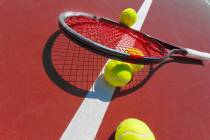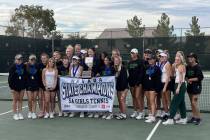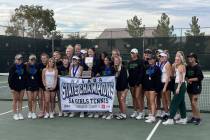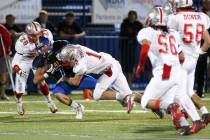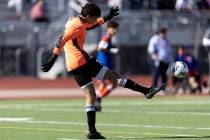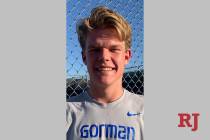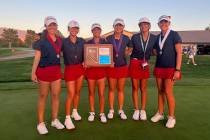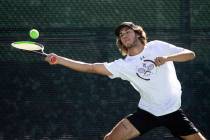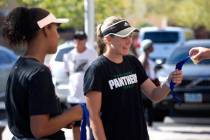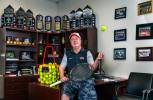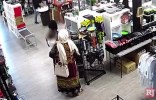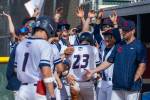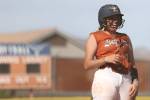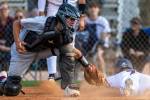September 22, 2010 - 3:37 pm
A little more than two years ago, Hadrien Saperstein couldn’t even walk.
Paralyzed by transverse myelitis in the summer after his freshman season on Palo Verde’s boys tennis team, Saperstein mainly was confined to a bed, his tennis game limited to hitting balls while in a wheelchair.
Two years and countless hours of therapy later, Saperstein isn’t just walking.
He’s back on the court, playing again for the Panthers and hoping to help the team win another state championship in his senior year.
“It’s a little strange and different,” Saperstein said. “The way I go through life is a little different now. The way I go through practice now is different. I see it more as a privilege now. It’s not a given that I play tennis. I have to earn it.”
Whether he has earned a return to competitive tennis isn’t the question.
On June 22, 2008, Saperstein began having lower back pain and tremors. A doctor diagnosed him with heat exhaustion and gave the then-15-year-old intravenous fluids and Valium to stop him from shaking.
Five days later, Saperstein was in California to play in a United States Tennis Association national tournament. That night he barely could stand. When his father came to bring him home, Saperstein barely could move.
By the time he reached the emergency room at Summerlin Hospital, he had virtually no upper-body strength, couldn’t move any part of his body below the diaphragm and was shaking so badly he couldn’t hold a glass of water.
Saperstein was in the hospital five days before being diagnosed with transverse myelitis. He was given steroid and blood treatments.
By the middle of July, Saperstein was transferred to HealthSouth Rehabilitation Hospital, where he began learning how to walk again by using a walker and canes.
Saperstein returned home in August, walking with the use of a cane.
“I just slowly got better,” he said. “I went through a lot of therapy. Rehabilitation came a little easier because of my background in tennis. Eventually I was good enough that I could go to the gym by myself.”
By the following spring, he had started to walk under his own power.
“Even after I dropped the cane, it wasn’t exactly a glorious walk,” Saperstein said. “It looked really strange. It wasn’t natural. I was like an 80-year-old man walking. It wasn’t pretty. Even now I sort of have a little limp.”
Saperstein worked tirelessly day after day to regain something many take for granted.
“He worked hard every day to get back to where he was. We’re all really proud of him,” said Palo Verde senior Zach Bellon, one of Saperstein’s closest friends. “It’s really just awe-inspiring. I was there when it happened. I was with him through all of rehab. For him to come out here and start playing, it’s a great inspiration.”
Saperstein’s movement still is somewhat hindered.
“There’s just a little bit of side effects that you notice,” Palo Verde coach Zach Brandt said. “Some of the lower-body movement is still a little slow, but he anticipates the ball really well. He can’t sprint like he used to. It’s more of a quick couple steps. He can’t hustle the way he did when he was a freshman.”
Saperstein was a smallish, scrappy player as a freshman. As the Panthers’ No. 2 singles player, he frustrated his opponents with his ability to run down nearly every ball.
And he had a seemingly endless supply of energy.
“I used to be in such tremendous shape,” he said. “I used to be able to run for hours, five or six hours a day, and the next day run five or six hours. Now I walk 10 minutes and the next day I’m sore.
“My dad wakes up in the morning, and he walks out of his room holding his back, and I walk out of my room, and I’m holding my back. We just look at each other, and we’re like, 'Aw, Christ.’ ”
Saperstein has altered his game. Instead of relying on speed and endurance to chase down balls, he uses his mind more than he ever did.
“He’s a smart tennis player,” Brandt said. “He compensates a little bit by anticipating where the ball will be. He’s definitely making improvements every time I see him up here.”
Saperstein, too, sees improvement, albeit gradual.
“It’s month to month,” he said. “Day to day just doesn’t happen. Every time I reach a new peak, I can see a difference, but I have to work every day.
“I used to rely more on my natural ability. Now I have to rely more on my tactical ability. Tennis is a lot of quick, repetitive side to side, forward and back. I can’t get to as many balls.”
As he was before he contracted the disease, Saperstein is home-schooled. As a freshman, it allowed him more time to work toward his dream of playing college tennis. Now, it allows him more time to work on his rehabilitation.
His family lives in Palo Verde’s zone, allowing both he and younger sister Victoire to play for the Panthers.
“It’s beyond words to say how much of a boost it is to see him out here playing,” Brandt said. “He’s going to be a key part to what we’re doing.”
Saperstein has played singles and has worked in practice on playing doubles so far for the Panthers. He’s fine playing in either role as long as it means he’s helping the defending Class 4A state champions and continuing on with his goal of playing in college.
“It may sound funny to say this, but I really do feel honored to have gone through it,” Saperstein said.
And while he downplays the notion of being an inspiration to his teammates, it’s clear that having Saperstein on the court means as much to the team as it does to him.
“Emotionally for this group of kids, it’s monumental because all of them know Hadrien,” Brandt said. “He’s always been a part of our program even though he didn’t play. He’d come up and watch matches and hang out with the kids. To finally see him back playing for us and for himself, it’s good for everybody.”









